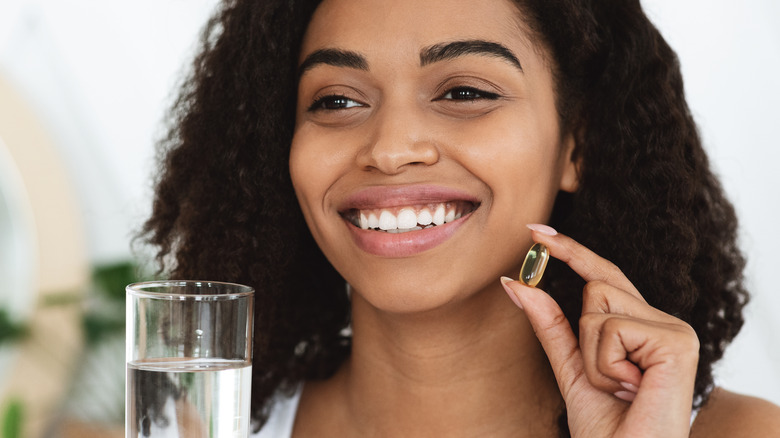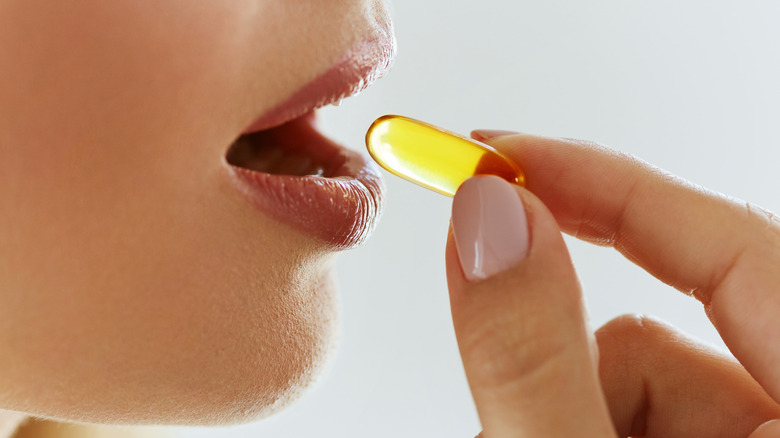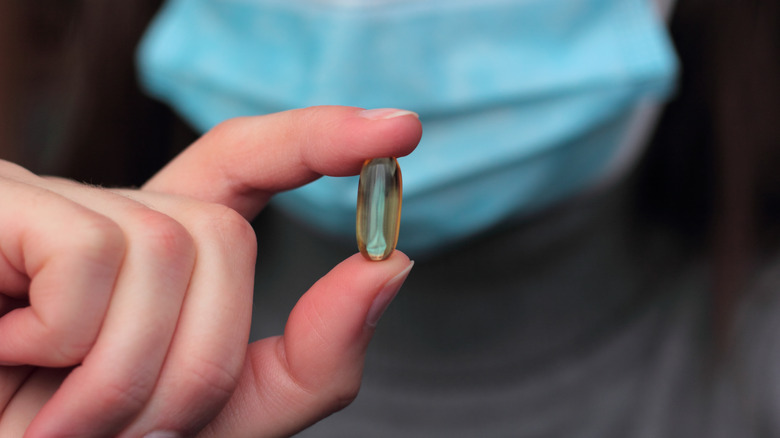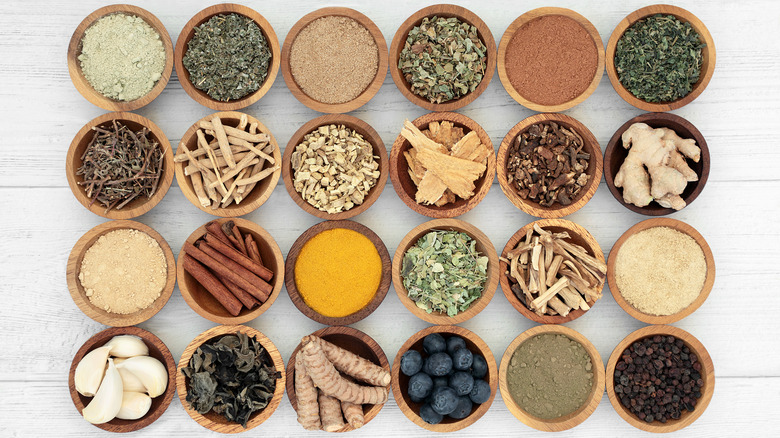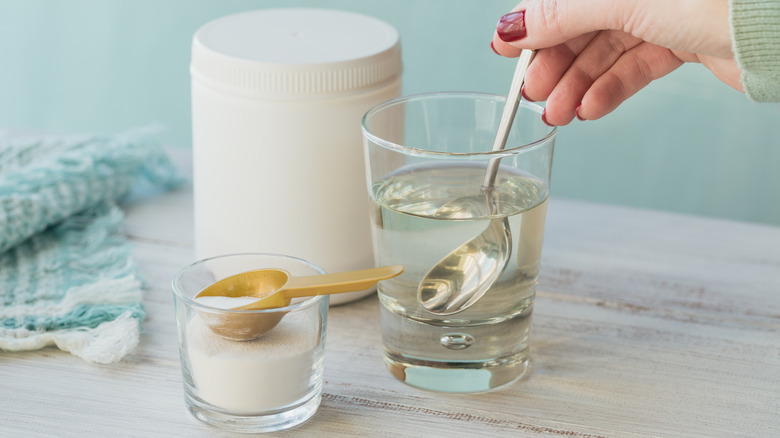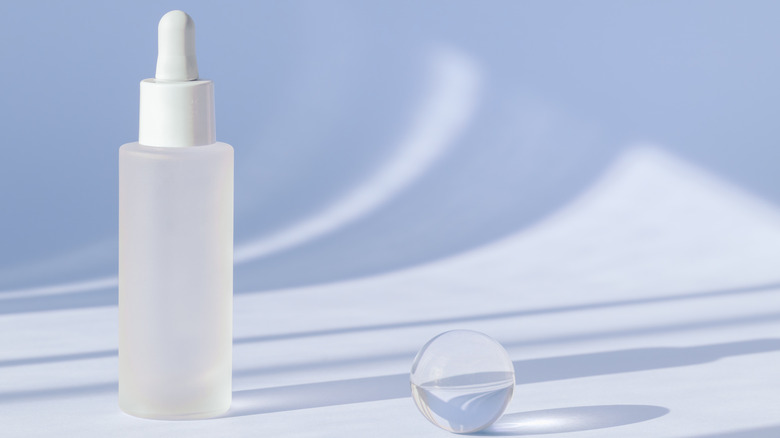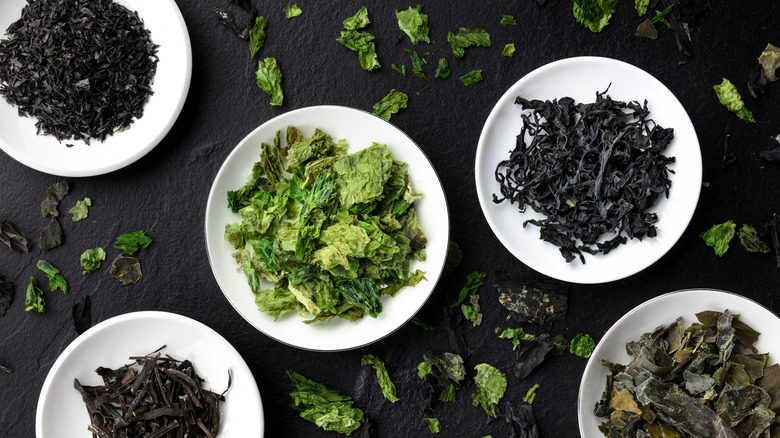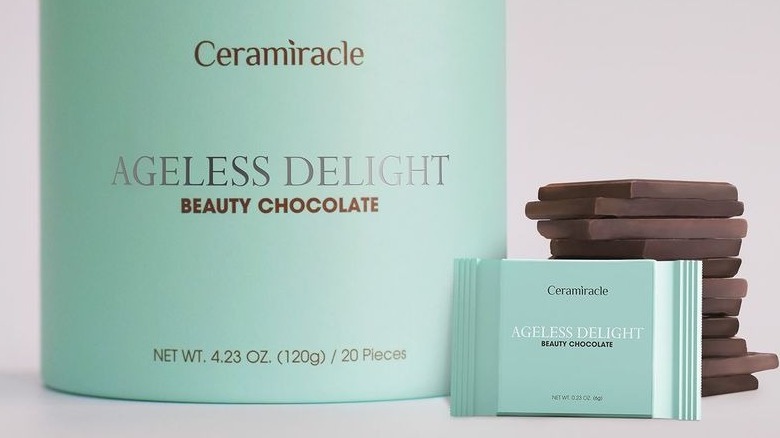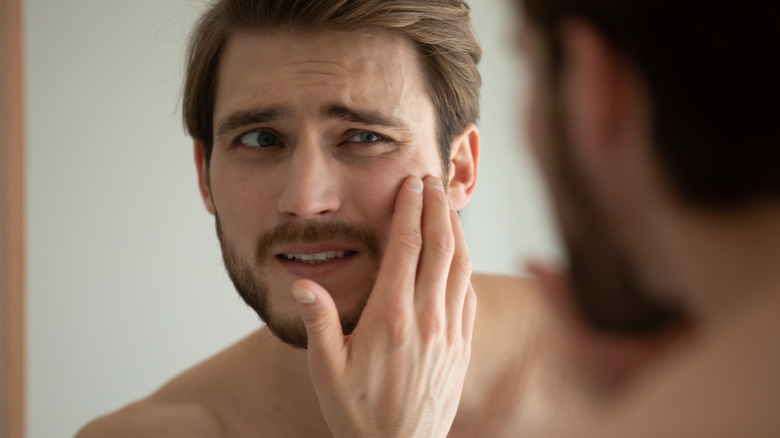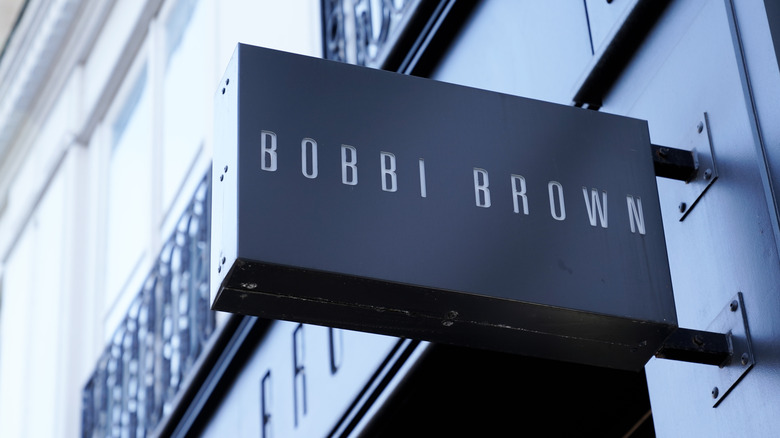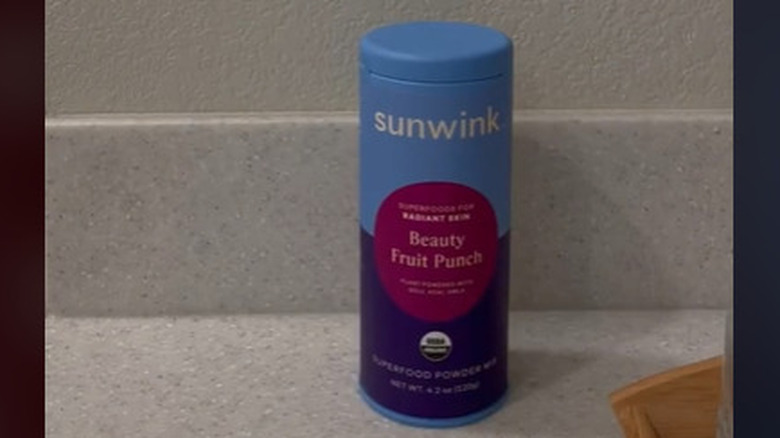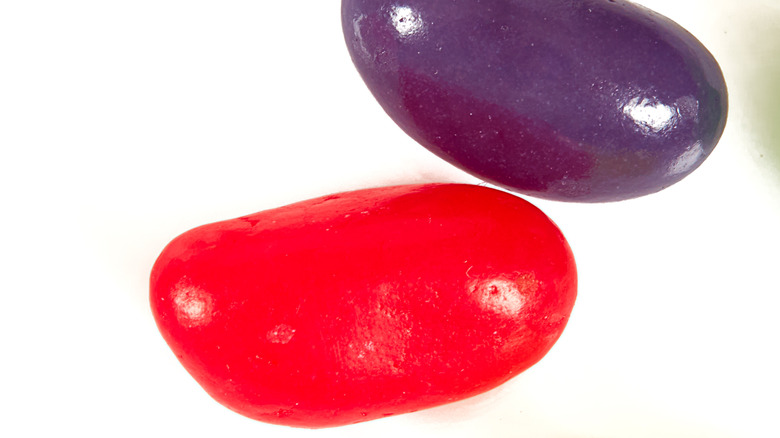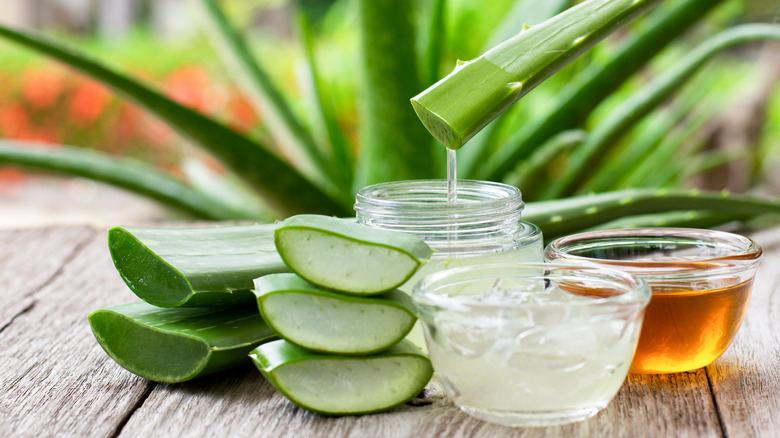Everything You Wanted To Know About Edible Skincare
The global beauty ingestibles market, which was worth $3.2 billion in 2021, is set to grow to $8.3 billion by 2030, according to an InsightAce Analytic report (via Cision PR Newswire). From the looks of it, the future wellness space will take into account the role of nutrition in driving wellbeing, by providing supplements that target specific areas of the body. Edible skincare products, for instance, aim to maintain and enhance the health of one's skin, keeping it glowing, radiant, and smooth.
Indeed, skincare isn't merely about slathering on some moisturizer when you hit a certain age, but a greater interest in the connection between being visibly healthy and actual wellness. Emphasizing not only nutrition but also prevention, ingestibles offer a new approach to skincare by further incorporating it into one's lifestyle and diet.
Advancements in the beauty industry — including a growing body of research pertaining to the ingestibles market, as well as rising consumer interest — is pushing the beauty ingestibles market forward as a whole and presenting these products as part of "a healthy ageing solution" (via Mintel). If you've ever been curious about edible skincare, here's everything you need to know.
Edible skincare is about health and wellness from within
From the name itself, edible skincare involves ingestibles — not skincare products that you apply topically (like lotions, toners, and face masks), but ones that you actually consume. The idea is that by ingesting ingredients that are good for the skin, you can actually look after it on a deeper level (via Sundaily). A feature in Coveteur highlights this "inside-out approach to skincare," which can be part of a routine that also incorporates topical applications. Ingestibles go straight into the body, potentially impacting it at a cellular level with active ingredients that it can absorb more easily. Ingesting collagen peptide, for example, allows it to quickly enter the bloodstream, thereby making it possibly more efficient than applying a cream or serum.
Edible skincare is part of nutricosmetics, which involves supplements designed to promote wellbeing. In a Cosmetics Design feature, Nutribloom Consulting founder Paula Simpson points out that nutricosmetics has become extremely popular in the U.S., particularly among the millennial market. She also notes how this has grown from consumer interest in clean, organic beauty products. With the concept of beauty today being so intrinsically linked with nutrition, wellbeing, and feeling good, edible skincare is all about skin health and how supplements can support it.
Interest in skincare ingestibles rose during the pandemic
A holistic approach to wellness incorporates both beauty and wellbeing, which may explain why edible skincare has become so popular in recent times. Other possible factors include the shift in consumer values toward making ethical choices, a demand for sustainability and greater transparency from companies, and a desire for cleaner, more plant-based products.
This includes the blue beauty movement, which is all about embracing ingredients and packaging that don't harm the ocean's ecosystems (via Vogue). During the global pandemic, this personalized approach to overall health intensified, as did the ties between skincare, beauty, and health. Add that to anxiety (which takes its toll on the skin) and regulations on wearing face masks, and it's no surprise that ingestibles are becoming part of the mainstream. Per Global Cosmetic Industry, immunity-boosting ingestibles (including edible skincare) became even more in demand during the pandemic. The article cites data from machine intelligence platform Spate that showed wellness-related terms such as "purifying," "peeling," and "antioxidant" trending in 2020 online searches.
Back in 2017, the Global Wellness Institute predicted the global market for nutricosmetics to be $7.4 billion per annum by 2020. Meanwhile, there's been a noticeable increase in terms of consumers searching for supplements online, which also connects to a general shift toward seeking information about health (and edible beauty products) through the internet.
Natural adaptogens are edible herbs and roots
Adaptogens, which are fast becoming a big buzzword in ingestibles, are plant-based ingredients that bring your body back into balance (via the Cleveland Clinic). They're added to ingestible products, and are intended to support your body in its reaction to certain challenges (like stress). They can be added to food and drinks, or taken orally as a tincture or capsule. Since stress and skincare are so inexorably linked, adaptogens are connected to the edible skincare world, too. Derived from botanical sources such as ashwagandha and reishi mushroom (via Well+Good), adaptogens are used to target specific skin conditions (like eczema and psoriasis), or for generally quelling inflammation and rehydrating the skin.
The skin is pummelled with a lot of stress, including injuries, illnesses, and even hormonal activity. In addition, pollutants in the environment take their toll on the body as well, increasing the presence of free radicals and compromising the skin's defenses (via Ogee). All of these affect how your skin looks, as well as its overall health. According to Health & Wellbeing, some herbs and roots that could potentially counter this include Siberian ginseng (for tired, aging skin that's dehydrated) and rhodiloa rosea (a plant that grows in Canada which is purported to reduce wrinkles and increase skin firmness).
Edible collagen is a growing trend
A Meticulous Research report states that globally, the collagen market is set to be worth around $8.64 billion by 2029. A natural protein in the body, there are three types of collagen boosting a multitude of functions, including skin health.
Typically used as an injectable and an ingredient in face creams, collagen has also been incorporated into nutricosmetics, including edible skincare products (via Global Newswire). Per BBC Food, it's becoming increasingly popular as an ingestible (e.g., collagen powders and chocolate bars). Some specialists purport that hydrolyzed collagen (ingested as peptides) encourages collagen production. Whole collagen, which becomes peptides once eaten, travels to the skin and gives it a boost. Studies are ongoing, but there is some evidence that edible collagen may improve hydration and fight visible signs of aging (via a 2015 study published in the Journal of Cosmetic Dermatology).
Collagen production decreases as you age, yet there's no conclusive proof about the extent to which edible skincare supplements help. However, edible collagen has been a thing in Asia for quite some time, and is growing in popularity and prevalence in the United States (via Spa Finder). In 2017, Fox News reported that U.S. fresh fruit juice chain Jamba Juice introduced a smoothie with a shot of collagen. Meanwhile, Bulletproof created a collagen protein bar for Whole Foods. Overall, lifestyle, diet, and sun protection are crucial in one's anti-aging goals, with topical collagen peptides said to be part of the solution (via Forbes).
Hyaluronic acid is an edible skincare supplement
Hyaluronic acid is a naturally present carb found in the skin, and like collagen, its production slows down as you age. Certain schools of thought connect hyaluronic acid with helping skin conditions such as eczema, as well as wrinkles and other visible signs of aging (such as fine lines). Verywell Health reports on the results of a 2017 study that revealed that when an oral formula of the acid was taken, lines around the eyes reduced in terms of quantity and severity, while the skin looked more radiant and youthful. Another 2017 study revealed benefits in terms of the skin's elasticity, hydration levels, wrinkle depth reduction, and overall texture.
Meanwhile, researchers in a 2022 study (highlighted in Cosmetics Design) administered a novel sodium hyaluronate both topically and as an ingestible. While the study concluded that more research is required, the results suggest that signs of aging improved. It also noted that while natural hyaluronic acid levels may be present in the dermis of older people, it may not be in the epidermis, which means that the skin is less hydrated. According to an interview with Dr. Whitney Bowe, author of "The Beauty of Dirty Skin: The Surprising Science of Looking and Feeling Radiant from the Inside Out," in W Magazine, hyaluronic acid can help "when the skin is naturally less able to trap moisture" after you hit your 40s and 50s.
Marine algae is on the skincare menu
For centuries, seaweed or marine algae has been used in Asia for both culinary and medicinal purposes (via griffin+row). Wakame seaweed, for example, is said to be beneficial in skincare products that target anti-aging because of its antioxidizing properties. Research shows that as an edible skincare ingredient, marine algae can boost moisture levels in the skin, improving hydration. On top of this, it may also reduce the negative impact of enzymes which have a damaging effect on the skin. In Europe, demand for edible marine algae such as spirulina and chlorella is on the rise (via CBI).
Founded by the grandson of famed oceanographer Jacques Cousteau, SeaWeed Naturals adds edible marine algae into its products, noting how the ingredients are designed to improve collagen levels, are powerful antioxidants, and combat the signs of aging while promoting skin health. The use of botanicals from the seas and oceans is also tied into supporting the marine environment in a healthy and positive way (via Happi). Meanwhile, athlete and social media influencer Sommer Ray is the spokesperson for a plant-based edible product by Imarais Beauty that aims to moisturize the skin using marine algae from Nova Scotia (via Happi). And as Grazia reports, Vida Glow's ingestible marine algae products have gained quite a celebrity following.
Ceramides hydrate the skin
Many people have heard of collagen, but may not be familiar with ceramides. A lot of ingestibles feature this ingredient due to the fact that they're the building blocks that make up the epidermis. These natural fatty acids lock moisture in and create a barrier, hindering pollutants and free radicals from damaging the skin.
Phytoceramides come from plants, and because they're not so different from naturally occurring ceramides in the body, they're becoming more prevalent in skincare use (via Healthline). A Mintel report suggests that along with collagen and hyaluronic acid, ceramides are increasingly one of the on-trend ingredients to be taken orally, noting how aging results in lower production and skin that's less robust against negative impacts. Meanwhile, ingestible products with "functional beauty claims" (e.g., beauty benefits, UV protection, etc.) increased between 2017 and 2021 by 78%.
One product, DEFENCERA, is a powder made from brown rice ceramides (via Women's Weekly). The company claims to provide 24-hour hydration in one sachet, and states that this is "Japan's first and only government-certified oral skin care verified for its safety and effectiveness in preventing moisture from escaping the skin on the entire body." Reportedly, the powder inspires the production of more skin-barrier-protecting ceramides. In 2019, Ceramiracle created beauty bars, combining chocolate and ceramides to create an "ageless delight" (via Lady and the Blog). With the edible skincare space expanding, products with ceramides will likely become more prominent in the near future.
Men are becoming more interested in skincare
In the past, there may have been a tendency to focus on women when it came to skincare. Nowadays, this is no longer the case. Men across the globe have become increasingly invested in skincare — and with the holistic nature of ingestibles and their focus on healthy ingredients and nutrition as part of a good skincare regimen, this market is undoubtedly of great appeal to male consumers as well.
For starters, the global edible beauty products market is undoubtedly growing alongside male consumers' interest in skincare. According to Euromonitor International, there was noticeable growth in both the number of hydration products and the number of ingestible products with skincare-related claims from 2019 to 2020. In addition, the report cited a 2021 survey that revealed that 38% of men used moisturizer each day, while 50% used such products one to three times a month.
Apart from how male consumers are becoming bigger stakeholders in the skincare industry, companies have also been targeting them with gender-specific products as well (such as collagen for men by Japanese food company Meiji and wellness supplements by U.S. brand hims).
Bobbi Brown makes functional gourmet chocolates
If the idea of skincare and chocolates combined sounds appealing, then you're in luck, because not only are skincare ingredients becoming edible, they're also being made into bite-sized delicacies, too.
The growing crossover between beauty and wellness has led to a number of established cosmetics brands and stakeholders entering the edible skincare arena, including renowned beauty entrepreneur Bobbi Brown. According to Harper's Bazaar, the creator (whose eponymous brand has its own wellness line called EVOLUTION_18) set her sights on this industry by becoming a wellness coach before developing supplements to promote better skincare. And in an interview with Forbes, the woman behind the brand highlights one skincare edible that certainly sounds appetizing: Beauty Bites, bite-sized chocolates "infused with beauty foods like biotin, hyaluronic acid, and collagen.
Brown shares that her dream was to create chocolates that not only tasted good, but were also "full of good-for-you ingredients [...] that all work to keep your skin, hair, and nails healthy." Exclusively available at Walmart, these so-called "functional gourmet chocolates," come in milk and dark chocolate varieties, both with peanut butter filling.
A model's skincare secret: her own wellness brand's vitamin powder
Australian supermodel Elle Macpherson (who received the moniker "The Body" from Time Magazine in 1989) set up her supplements-focused wellness business, WelleCo, in 2014 (via The Sun). Her brand offers a range of beauty and wellness products, including a concentrated vitamin powder that she herself uses.
In terms of looking after her skin, the model turned entrepreneur and wellness guru told Glossy Magazine about her daily routine. This involves cleansing with a glycolic wash, dry-brushing her skin, and taking a hot shower before blasting herself with cold water. After moisturizing her skin with an organic cream, she adds sunscreen. Another important part of her skincare? Her very own product, called Super Elixir. On her website, she highlights her routine for glowing skin by drinking three liters of water each day, as well as how she uses tumeric and ginger to make her juices.
The model recommends mixing Super Elixir with spring water or coconut water for glowing skin. She states that the powder, which she drinks in the morning after a lemon-water, supports collagen production and creates brighter skin that also feels firm (via Mail Online).
The brand's supplement line includes lemon and ginger, blood orange, and an original green powder with over 40 plant-based ingredients. The Collagen Elixir, for example, is a marine collagen peptide product. Meanwhile, The Skin Elixir is WelleCo's award-winning "green" capsule product for promoting healthy skin and inner health.
Sunwink superfoods launch in Target in 2022
Beginning life as a plant-base beverage company in 2018, Sunwink has quickly gained a following in the wellbeing world. Their Berry Healthy Skin powder is made with acai, goji berries, and amla berries. This is part of a range of wellness products, some of which are available at Target after launching across the U.S. in 2022 (via BevNET). Other products include the Detox Greens powder (which contains celery, dandelion and spirulina) and the Beauty Fruit Punch powder for glowing skin, which contains no artificial sweeteners or additives (featured on TikTok via @sunwink).
Sunwink's powders can be added to hot or cold water, a smoothie, juice, or coffee. The female-owned company aims to bring superfoods to the "beauty from within" movement and the edible skincare space through accessible, sustainable products. According to Glossy Magazine, the goal of co-founder Eliza Ganesh is not just to offer wellness ingestibles at a certain price point, but also to reach ordinary consumers rather than those looking for perfection. Meanwhile, the brand has already gained traction through other outlets such as Whole Foods, and by adding the superfood powders to their line of wellness beverages in 2021 (via BevNET).
Nature's Bounty give jelly beans a biotin boost
In a 2020 CRN survey, 22% of those taking supplements reported they were doing so to benefit their hair, skin, and nails. Given that some three-quarters of people in the U.S. take some form of dietary supplements, edible skincare has definitely got to be a sit-up-and-take-notice market. One company that's carving out its own brand of ingestibles for healthy skin is Nature's Bounty. Its softgels contain biotin, and are designed to improve skin, hair, and nail health. There's also a variety that has collagen added to it as well.
In the middle of 2021, the brand also debuted jelly beans with double the amount of biotin, plus keratin and vitamins A, C, and E. With its history and experience in the ingestibles space, the brand aims to continue meeting growing demand from consumers. With products available in CVS and Walmart, the jelly bean supplements — which are mixed berry, watermelon, and strawberry-flavored — are aimed toward a broader consumer market instead of an exclusive clientele. As more people come across and try edible skincare products, the awareness and demand for such offerings are expected to naturally grow (via Cision PR Newswire).
Food-grade skincare products are good enough to eat
While edible skincare and other supplements in the form of ingestibles excite consumers and change the market, other related spaces benefit as well. In the case of topical skincare, there's a growing trend of releasing products that, while certainly not intended for human consumption, can be considered good enough to eat. That's not to say that you'll want to eat your moisturizer, of course. Simply put, it means going for products with food-grade ingredients: a growing market of skincare essentials with components that wouldn't harm you if you were to consume them (via Cosmetics Design).
Ayurvedic skincare has been around for thousands of years, and includes using plants and herbs as ingredients for all-natural skincare products; thus, it mirrors many of today's skincare concoctions made at home (via WebMD). While Ayurvedic skincare products may be topical, the concept is similar to the current food-grade skincare movement in that the focus is on natural ingredients that you put on your skin that you wouldn't be against taking orally.
However, as with all supplements and herbal remedies, it's always best to check with your physician before using any of these products, especially if you have preexisting health conditions.

